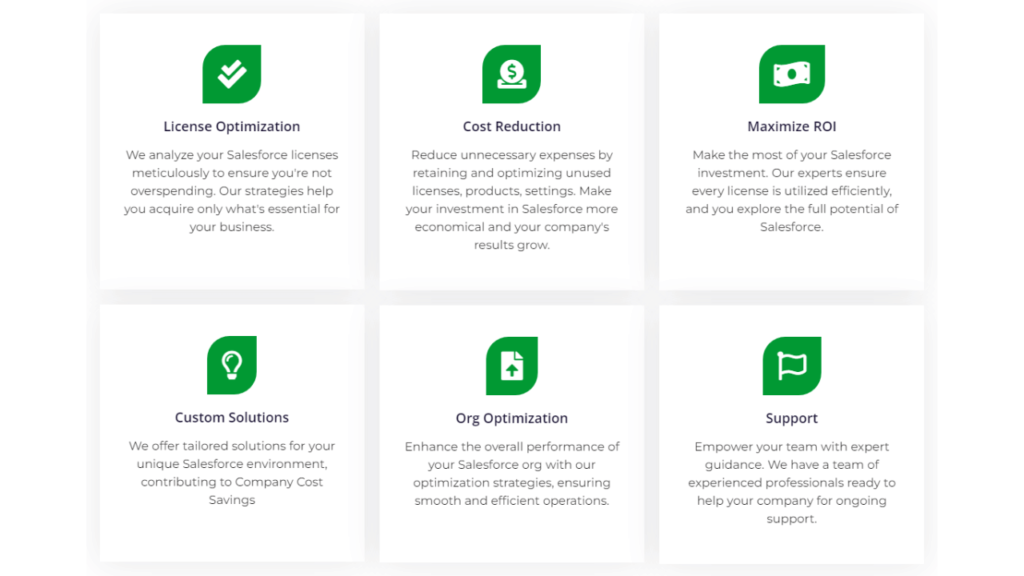What is Salesforce? What is it for? and what are the benefits of using it? If you haven’t immersed yourself in the world of customer relationship management (CRM) software, Salesforce can be a relatively unknown term.
But whether you’re just curious about the major players in the CRM space or thinking about implementing this system in your organization, we’re here to turn you into an expert.
So, let’s dive right in.
What is Salesforce?
Salesforce is an expansive infrastructure encompassing a range of customer relationship management (CRM) software products.
These products play a key role in enabling marketing, sales, commerce, services and IT teams to establish robust connections with their customers. This alone makes it a powerhouse in the CRM area.
While Salesforce’s origins lie in its role as a Software as a Service (SaaS) company, it has since evolved into a Platform as a Service (PaaS) entity. What does this transformation signify?
Salesforce’s Shift to a Comprehensive CRM Ecosystem
This means that Salesforce customers not only have access to a ready-to-use CRM system, but also the ability to build their framework components, including Lightning components, and develop custom applications on the Salesforce Lightning platform, known as Force.com.
In addition, they can become partners by giving them the opportunity to market their software products in the Salesforce app marketplace, AppExchange.
Furthermore, is a strong advocate for ensuring that its users and companies have a comprehensive understanding of the platform’s capabilities and features. To achieve this, they have established an online training hub called Trailhead.
Here, users can access a wealth of educational resources, including learning modules such as “Salesforce Platform Basics,” and benefit from expert support through the Trailblazer Community.
To date, the platform has proudly served more than 150,000 customers worldwide and has played a vital role behind the scenes for business giants such as American Express, Sony, Coca-Cola Enterprise, Charles Schwab Corporation, TD Ameritrade and many others.
In the contemporary scenario, the platform stands out as a dominant force in the CRM market, boasting over 20% of the market share, with clear indications that its stock prices are set for continued growth.
It is also known for its range of business and product acquisitions, with notable additions including ClickSoftware, Mulesoft and Tableau.
Now, why is this an attractive choice for companies ranging from startups to Fortune 500 corporations?
To fully understand this, we need to embark on a journey to explore the historical context, the CRM market and the evolution of the CRM landscape.
This will provide us with a comprehensive view of why Salesforce holds such a significant place in the world of CRM and why businesses across the spectrum are readily embracing it.
A Brief Background on Salesforce and CRM

CRM, or Customer Relationship Management, represents a technology dedicated to enhancing a company’s ability to manage and nurture its interactions and relationships with customers and potential clients.
Essentially, CRM software serves as the bridge that keeps companies connected with their customers, streamlines various processes, and ultimately enhances profitability.
In 1999, the company triggered a seismic shift in technology and the domain of CRM, becoming one of the pioneering companies in cloud computing.
What set it apart from the traditional CRM model was its innovative approach. It chose to deliver its software through web browsers, a deviation from the conventional method of housing software on internal servers.
This forward-thinking approach resulted in significant cost reductions across the board, encompassing development, deployment, maintenance, and support.
In addition to cost savings, Salesforce’s platform allowed users to access their CRM software from virtually anywhere, eliminating the need for confinement within office premises.
In addition, the company introduced a unique combination of simplicity, scalability and online accessibility to data from any corner of the world, catapulting it into an instant global leader in the CRM market.
What is Salesforce used for?
The ecosystem encompasses a diverse range of cloud platforms that give users the ability to interact with a variety of data types, allowing them to serve their customers in various capacities.
Yet, despite the array of products, customer relationship management (CRM) remains the cornerstone of Salesforce’s entire model. This CRM system has been meticulously optimized to cater to the specific needs of various businesses operating within the Salesforce Clouds.
Now, it’s time to unveil these significant products that serve different niches and optimize business operations.
Salesforce Product Ecosystem
The ecosystem encompasses a variety of cloud platforms, each designed to meet distinct business needs and enhance various aspects of a company’s operations. One of these integral components is Salesforce Sales Cloud, the foundation of the company’s success.
Salesforce Sales Cloud
This tool stands out as the CRM platform that initially catapulted the company into the spotlight. It was their first and most renowned product, designed for meticulous management of a company’s sales activities.
Originally crafted for B2B (Business-to-Business) companies to guide potential customers through a structured sales cycle, the Sales Cloud has since expanded its reach to encompass B2C (Business-to-Consumer) companies.
Key components of the Salesforce Sales Cloud include:
- Lead: Individuals or entities expressing interest in your products or services.
- Account: Companies you wish to track and engage with.
- Contact: Employees of the companies you are focused on.
- Opportunity: Potential deals that could translate into new business, supported by the confidence of your sales team.
The Salesforce Sales Cloud operates seamlessly by allowing for the conversion of Leads into Account, Contact, and Opportunity objects. Moreover, Opportunities can be fine-tuned with stages and probability levels. Notably, the Sales Cloud provides built-in features such as quoting and opportunity forecasting.
In addition to its standard offerings, the Sales Cloud empowers users to customize these objects by adding fields that are relevant to their business operations. For instance, if your company offers a variety of services or products, you may create a segment to track the product interests of your Leads.
The Sales Cloud also excels in task tracking and workflow automation, simplifying processes by automatically generating tasks based on predefined criteria. For example, upon the creation of a new Lead, the system can instantly generate a sequence of tasks for reaching out to or following up with the Lead.
Features are further enriched through a variety of complementary features and extensions, including Sales Engagement (formerly High-Velocity Sales), CPQ & Billing, Revenue Intelligence, Sales Cloud Einstein, Marketing Cloud Account Engagement, Email & Sales Alerts, Partner Relationship Management, External Applications, Inbox, Einstein Conversion Insights, Einstein Relationship Insights, Sales Dialer for Fundamentals, Sales Enablement, Social Intelligence, Maps and Maps Territory Planning.
For organizations seeking to enhance their sales operations and implement a finely tuned CRM solution, Salesforce.
Exploring Salesforce Revenue Cloud: What is Salesforce Revenue Cloud and How Does it Work?

Revenue Cloud, often called CPQ (Configure, Price, Quote), is an innovative solution that was brought to the portfolio through the 2015 acquisition of Steelbrick.
Now, you might be wondering, “What is Salesforce Revenue Cloud, and how can it benefit your business?”
What is Salesforce Revenue Cloud?
At its core, Revenue Cloud represents a set of robust tools designed to facilitate and enhance the Quote-to-Cash process.
It seamlessly integrates with Salesforce’s suite of products, making it a pivotal part of their ecosystem. But what does it bring to the table, and why should you be interested in it?
Key Features and Capabilities
Revenue Cloud, including CPQ and Billing, is primarily geared towards simplifying and streamlining your organization’s revenue operations. By optimizing this critical aspect of your business, you can significantly improve efficiency and drive profitability.
CPQ: Configuring, Pricing, and Quoting
CPQ is all about enabling your sales team to configure complex product offerings, establish precise pricing, and generate accurate quotes quickly. These capabilities are crucial for businesses that offer a diverse range of products or services.
When asked, What is Salesforce CPQ? you can now confidently answer that it is the solution that empowers your sales team to create tailored quotes, ensuring that your customers receive offers that match their unique requirements.
Salesforce Billing Solution: Simplifying the Billing Process
The Billing Solution is the part of Revenue Cloud that handles the end-to-end Order-to-Cash lifecycle. This includes creating invoices, managing payments, and recognizing revenue once the quote is finalized.
By automating and streamlining billing processes, you can significantly reduce errors and enhance the customer experience.
Advanced Revenue Cloud: Taking it to the Next Level
For businesses with more complex needs, the Advanced Revenue Cloud steps in to provide additional features.
These include advanced approval processes, standalone or multi-cloud billing, comprehensive financial logging, customer asset lifecycle management, tax calculations, and seamless integration with customer storefronts.
So, if you’re asking, “What is Salesforce Advanced Revenue Cloud?” – it’s the solution that takes your revenue management to the next level.
Why Opt for Salesforce Revenue Cloud?
The answer to the question, “What is Salesforce Revenue Cloud used for?” is clear: it is used to drive revenue optimization.
By leveraging the capabilities of Revenue Cloud, your business can improve the efficiency of your Quote-to-Cash process, enhance revenue recognition, and offer customers a seamless experience. In an increasingly competitive business landscape, these advantages can be the key to your success.
Exploring Salesforce Marketing Cloud: What is Salesforce Marketing Cloud and How Can it Benefit Your Business?

Marketing Cloud, often simply referred to as Marketing Cloud, is a versatile digital marketing platform that caters to both B2C and B2B marketers.
What is Salesforce Marketing Cloud?
At its core, Marketing Cloud is a robust platform designed to empower marketers in their efforts to connect with customers and track their journeys across various communication channels.
But it doesn’t stop there. With Marketing Cloud, you can effectively manage your social media presence, execute email promotions, run digital advertising campaigns, create engaging content, and analyze valuable data.
Key Features of Salesforce Marketing Cloud
Marketing Cloud offers a wide spectrum of features to cater to your marketing needs. Here are some of its core functionalities:
- Multichannel Marketing: You can reach your customers through a variety of channels, including email, SMS, social networks, and digital advertising platforms. This multichannel approach allows you to engage with your audience using their preferred methods.
- Content Creation: Marketing Cloud provides built-in creation studios that enable you to craft and customize marketing content, ensuring it resonates with your target audience.
- Data Analysis: Comprehensive data analysis tools are at your disposal, allowing you to gain insights into your marketing efforts and customer interactions.
- Personalization: With features like Einstein Segmentation and Journey Builder, you can create personalized marketing campaigns tailored to individual customer preferences.
- Integration: Marketing Cloud seamlessly integrates with other products and services, providing a unified ecosystem for your marketing needs.
Components of Salesforce Marketing Cloud
Marketing Cloud encompasses several distinct components, each serving specific marketing purposes. Let’s explore some of these components:
Pardot (Marketing Cloud Account Engagement):
Pardot is Salesforce’s B2B email marketing automation tool. It empowers businesses to send emails to prospects on behalf of sales representatives and qualify leads for further sales engagement.
Pardot also offers the capability to build landing pages and forms, making it a versatile tool for B2B marketing. Integration with Engage, Engagement History Dashboards, and B2B Marketing Analytics Plus enhances its functionality.
Advertising Studio (Advanced Cross Channel):
Advertising Studio within Marketing Cloud provides advanced campaign management and targeting solutions for digital marketing campaigns. It’s a valuable tool for marketers looking to optimize their advertising efforts across various channels.
Distributed Marketing & Marketing Cloud Connect:
This component offers a managed package that can be installed in your CRM environment. It enables distributed teams, including advisors and partners, to view, personalize, and send content directly from the CRM. This simplifies content collaboration and ensures a consistent and personalized approach to customer engagement.
Einstein for Marketing:
With Einstein for Marketing, marketers gain access to predictive insights that help create personalized messages and content. This component provides suggestions on when and how to engage with customers, enhancing the overall effectiveness of marketing campaigns.
Email Studio:
Email Studio empowers marketers to craft refined and personalized emails, incorporating dynamic elements and scripting languages. It’s a valuable tool for automating email journeys and building stronger, personalized relationships with clients.
Mobile Studio:
Similar to Email Studio, Mobile Studio focuses on generating marketing content for mobile devices. This component allows you to create messages for delivery via SMS, MMS, Chat, and Push notifications, ensuring that your marketing efforts effectively reach customers on their mobile devices.
Marketing Cloud Advanced Cross Channel: Elevating Your Campaigns
At the heart of advanced cross-channel marketing within Marketing Cloud lies Advertising Studio.
This feature is your gateway to efficient campaign management and precise targeting for your digital marketing endeavors. It unifies the management of campaigns across various platforms and channels, providing a centralized solution for your advertising needs.
Enhancing Collaboration with Distributed Marketing
Distributed Marketing, in conjunction with Marketing Cloud Connect, introduces a managed package designed for seamless integration with your CRM environment.
This powerful combination allows distributed teams, including advisors and partners, to access, personalize, and send content directly from your CRM. This functionality streamlines content collaboration and ensures consistent engagement with your audience, regardless of team size.
Empowering Personalization with Einstein for Marketing
Einstein for Marketing is the tool you need to make every customer journey and interaction highly effective. This intelligent feature equips marketers with predictive insights, enabling the creation of personalized messages and content.
It goes a step further by providing suggestions on the optimal timing and approach for engaging with customers. With Einstein for Marketing, you can tailor your marketing efforts with precision and deliver compelling, individualized experiences.
Customer Data Platform: Customer 360 Audiences
Formerly known as DMP, Customer 360 Audiences is a vital component of the Marketing Cloud product ecosystem.
This data-first digital marketing platform is all about unifying your customer data and personalizing every interaction.
With Customer 360 Audiences, you can build segmented lists of customers and customize your communications for specific audience segments, ensuring your message resonates effectively.
Streamlining Digital Advertising with Advertising Studio
Advertising Studio is a game-changer for centralized digital advertising within Marketing Cloud. This platform simplifies the management of advertising campaigns across major platforms, including Facebook, Instagram, LinkedIn, Twitter, YouTube, and Google Ads.
It’s your one-stop solution for achieving advertising campaign efficiency and effectiveness.
Enhanced Customer Engagement with Personalization
Marketing Cloud Personalization, also known as Interaction Studio, takes customer engagement to new heights. This tool helps you gain a deeper understanding of your customers’ preferences, enabling you to make data-driven decisions automatically.
By fine-tuning the AI algorithms that power your personalization strategies, you can deliver cross-channel personalized experiences throughout the customer lifecycle.
Insight-Driven Marketing with Marketing Cloud Intelligence
Marketing Cloud Intelligence, or Datorama, provides the means to connect, analyze, and take action on your data from a single marketing dashboard.
This comprehensive solution empowers your business to drive ROI, enhance speed, and achieve growth. With the ability to access and act on all your data, Marketing Cloud Intelligence is a powerful tool for informed decision-making.

Maximizing the Potential of Salesforce with OCS – Org Cost Savings
As your business prepares to embrace the power of CRM, simplicity becomes. OCS – Org Cost Savings, we offer consulting services designed to make complex processes hassle-free and affordable.
Simplifying Salesforce Challenges
Our team of consultants is well-equipped to tackle any Salesforce-related challenges you may encounter. With a strong commitment to simplifying even the Unmatched Expertise
At OCS – Org Cost Savings, we bring years of experience to the table.
Our Specializations
- Cost Reduction
- License Optimization
- Custom Solutions
- Org Optimization
- Maximize ROI
- Support

If you’re prepared to supercharge your Salesforce performance and streamline your expenses, our experts are here to guide you.
Reach out to us now to explore how our consulting services can revolutionize your business.
Keep in mind, reaching Salesforce success is at your fingertips, and tailor-made solutions are the path to it. With the perfect collaboration, you can cut down your Salesforce costs by as much as 30%.
We look forward to your contact.






